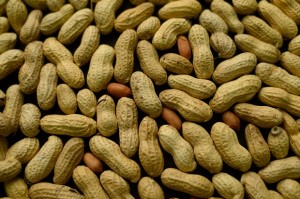What to know about new research on babies, peanut allergies

This Feb. 20, 2015, photo shows an arrangement of peanuts in New York. For years, parents of babies who seem likely to develop a peanut allergy have gone to extremes to keep them away from peanut-based foods. Now, a major study suggests that is exactly the wrong thing to do. AP
Children at high risk of developing peanut allergies are far less likely to do so if they are given peanut-containing foods before they turn 1, finds a major study that is expected to quickly change dietary advice to many parents.
Some things to know:
PEANUTS POSE A SERIOUS PROBLEM
Peanut allergies are rising and affect more than 2 percent kids in the United States alone. They are the top cause of food allergy-related severe reactions and deaths.
Food allergies often are inherited, but also can develop during life, and age of exposure may matter. In recent years, doctors have wondered whether avoiding certain foods in infancy does harm or good.
THE EXPERIMENT
Researchers in England studied more than 600 children ages 4 months to 11 months old with possible signs of an allergy but no strong evidence of one on a skin test. They were assigned either to avoid peanuts until age 5, or to regularly eat them, usually as peanut butter or a peanut puff snack.
At age 5, peanut allergies had developed in 3 percent of peanut eaters versus 17 percent of abstainers.
WARNINGS TO PARENTS
Don’t try this on your own. Babies in the study were tested to ensure they didn’t already have a peanut allergy before they were fed peanut-based foods.
Also, whole peanuts pose a choking risk. Doctors recommend peanut butter or other peanut-containing foods instead.
WHAT’S NEXT?
Food guidelines may change. The American Academy of Pediatrics used to recommend against giving children peanut-based foods before age 3 but dropped that advice in 2008 because there was no evidence it prevented allergies. Now, most parents introduce peanut-based foods when other solid foods are added unless a child is known to have a peanut allergy.
RELATED STORIES
Early exposure to peanuts helps prevent allergies in kids
How to stop allergies from bothering you














